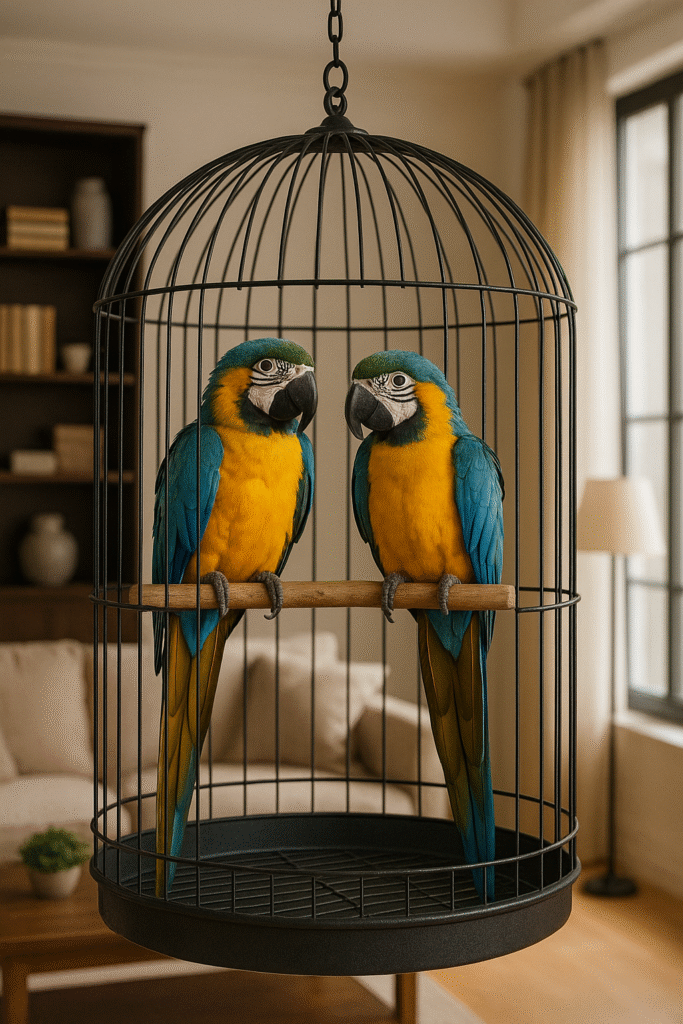Parrot is an intelligent and social bird. It is a colorful bird which can be easily domesticated. However, like other birds, they also do not like to live in captivity, so proper care is required to domesticate them. If you are thinking of getting a pet and you want to know how to take care of a parrot, then this guide is right for you.In this guide, we’ve tried to cover everything you need to know about caring for a parrot, from diet and housing to mental stimulation and health care.

Table of Contents
ToggleWhy Proper Parrot Care Matters
Parrots are long-living birds, with some species living up to 80 years! If given the right care, they can easily live their full lifespan. This is only ensured if they are healthy, happy, and busy. If their needs are ignored it can lead to behavioral problems, feather loss, and even illness which can shorten their lifespan.
Essential Tips on How to Take Care of a Parrot
1. Provide a Spacious and Safe Cage
Whenever you get a parrot, make sure that its cage is large enough for them to easily spread their wings and move around comfortably. Although the minimum size of the cage depends on the species, bigger is always better.
- Bar spacing: Make sure bars are close enough together to prevent escape or injury.
- Perches: Include natural wood perches of varying thicknesses to support foot health.
- Location: Place the cage in a social area, but away from drafts, direct sunlight, and kitchen smoke.
2. Feed a Balanced Diet
Since one of the main causes of health problems in parrots is poor diet, special attention needs to be paid to its diet. Here is what should be included in its diet:
- Pellets: Always include high quality pellets in their diet. Make sure pellets make up 60-70% of their diet.·
- Fresh Fruits and Vegetables: Include fresh fruits and vegetables in their diet daily. (Avoid avocados, onions, and chocolate- they are poisonous!).·
- Nuts and seeds: Include nuts and seeds in their diet in moderation (overeating can lead to obesity).·
- Clean water: Change their drinking water daily and clean the container to prevent the growth of disease-causing bacteria.

3. Ensure Mental Stimulation & Exercise
Parrots are extremely active and intelligent creatures. They require a variety of activities to avoid boredom. Therefore, to save him from boredom, you can take the following measures:
- Toys: Rotate chew, puzzle, and foraging toys regularly.
- Out-of-cage time: Give him at least 2-4 hours of supervised play time each day.
- Training: Teach tricks or commands to keep their mind active.
4. Maintain Proper Hygiene
You should pay attention to the cleanliness of your parrot and its surroundings every day. A clean environment will always protect it from infections and help keep your parrot healthy. For this, you do the following:
- Cage Cleaning: Remove feces and urine daily, deep clean weekly.
- Bathing: Give your parrot a soak in water or a shallow dish to bathe in.
- Nail and Beak Care: Trim nails when needed and provide a cuttlebone for beak care.
5. Monitor Health & Visit an Avian Vet
You need to keep a close eye on your parrot’s health because they hide their illnesses very well. So keep an eye out for the following symptoms:
- Fluffed-up feathers
- Loss of appetite
- Unusual droppings
- Lethargy
If you notice any such symptoms, then get it checked by an avian doctor to catch the problems early. However, it would be even better if you always get your parrot checked annually.
6. Socialize & Bond with Your Parrot
A parrot is a social animal and often prefers to live in a flock. If you keep it as a pet, it is your duty to ensure that it does not feel isolated from its flock. Since they need to interact with other parrots in their flock, you can do the following:
- Talk to them daily and sing to them.
- Try to handle them lovingly, this will increase their trust in you.
- Protect them from loneliness – never leave them alone at home. Consider having a companion at home if you have to go out of the house.
Common Mistakes to Avoid
- Ignoring their need for attention → leads to screaming or self-harm.
- Feeding only seeds → leads to malnutrition.
- Using harsh chemicals around them → their respiratory system is sensitive
Final Thoughts on How to Take Care of a Parrot
Caring for a parrot is a long-term commitment that requires time, patience, and love. By providing the proper diet, mental stimulation, and regular vet visits, you will ensure your feathered friend lives a happy and healthy life. Only if you can do this will my guide on “How to Take Care of a Parrot” be truly successful.